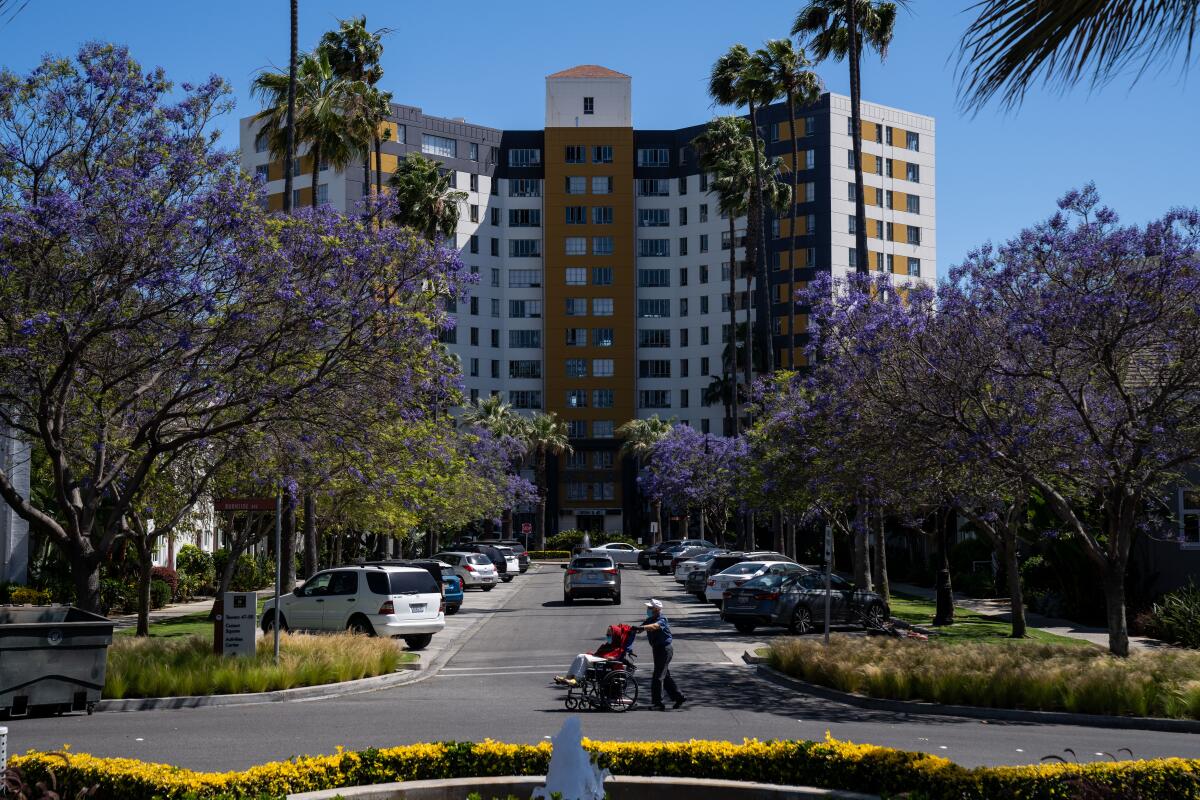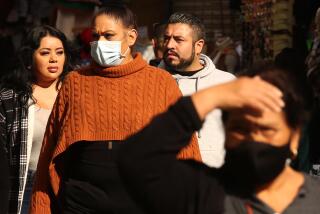I live in an apartment complex. If I get coronavirus, am I supposed to tell people?

If you are a renter, like most Angelenos, you might be wondering what to do if someone in your apartment complex tests positive for the coronavirus.
How worried should you be? What would your landlord do?
What happens if you are the one with COVID-19? Are you required to tell anyone?
As California ramps up testing for the general public, The Times set out to answer these questions and more. We spoke with three experts: Barbara Ferrer, director of the Los Angeles County Department of Public Health; Shira Shafir, a professor in the department of epidemiology at the UCLA Fielding School of Public Health; and Paula Cannon, a professor of molecular microbiology and immunology at USC’s Keck School of Medicine.
Here’s what they said.
The short, TL;DR answer
People who have been in close contact with someone who has tested positive for the coronavirus need to know. So if you are infected and you’ve been in close contact with your neighbors, you should tell them. If you haven’t, then you don’t have to. If you can, make a plan
One way to make the situation less stressful is to address what to do before you or anyone else you know tests positive. If you live in a small apartment complex where tenants are friendly, you can have conversations — socially distanced ones, of course — about what everyone is comfortable with in terms of telling each other and notifying the landlord, Cannon said.
“It’s best to have those discussions now, while there’s a hypothetical,” she said.
If you do agree to tell one another, you can talk about what help you might need if you’re self-isolating in your apartment.
“People can say, ‘Let me know if you need chicken soup and I’ll bring it around, or otherwise I’ll see you in two weeks,’” Cannon said.Act as if everyone in your complex already has the coronavirus
The coronavirus spreads through contact with the respiratory and saliva droplets from infected people. Because it can be transmitted through the air or by touching hard surfaces, the best practices for prevention will not change if your neighbor has it.
People should wear masks while using common areas. Everyone should wash their hands regularly. And, in heavily trafficked places such as apartment elevators and lobbies, people should try to limit what they touch.
“There’s a problem of thinking that if we tell people who’s infected, we’ll be safe,” Cannon said. “But it’s impossible to know who’s infected with this virus at any time.”
It’s worth it, for instance, to push elevator buttons with your elbow instead of your fingers — even if you end up on the wrong floor a few times, she said.
“What would you do different if you knew someone had coronavirus in your apartment complex?” Cannon said. “You’d say well, ‘I just wouldn’t touch the elevator button.’ Well, why don’t you just not touch the elevator button and then we can move on.”You don’t have to tell your neighbors you’re positive if you haven’t been in contact with them
There’s nothing about living in an apartment complex that inherently increases someone’s risk of contracting the coronavirus. As a result, there’s no reason you should feel compelled to tell your neighbors if you haven’t been near them or in a common area, Ferrer said.
“A tenant that lives in an apartment building that has not exposed anybody else in that apartment building doesn’t need to notify anyone,” she said.But if you have been in contact with them, make sure you tell them
By contrast, if you’ve tested positive for the virus, it is important to notify the people who you’ve been around lately, whether you live with them or not. And you can work with the county to trace your contacts. That way, others can isolate themselves to prevent further spread, Shafir said.
“I think it is largely the responsibility of the individual to submit to a contact-tracing process,” she said.You also should tell your landlord if you’ve spent time in common areas
Your landlord doesn’t need to know if you have the coronavirus. But if you live in a complex with a lounge or another type of shared space that you have used lately, it makes sense to notify the property manager, who then can help identify neighbors and maintenance workers who might have used it too.
“If you’ve spent time in those areas, it would be a good idea to inform the manager,” Ferrer said.There are some good reasons not to disclose that you’re sick
It’s reasonable for tenants to worry about telling others that they’re infected.
“We have a number of different examples where individuals have been stigmatized because of their diagnosis,” Shafir said. “At a time when people are struggling with social distancing and the economic consequences thereof, there’s a possibility in that struggle [that] people will look to blame others.” And some good reasons your landlord shouldn’t broadcast the information either
It may not make sense for landlords to tell an entire apartment complex if they learn one tenant is infected because of the same concerns about stigmatizing them. A better response would be to further increase cleaning efforts and help county public health officials with contact tracing.
“Instead of giving people a false sense of security, a landlord can provide cleaning supplies and otherwise provide protections for their tenants that will help them if someone is infected or protect people from getting the disease at all,” Cannon said.
More to Read
Sign up for Essential California
The most important California stories and recommendations in your inbox every morning.
You may occasionally receive promotional content from the Los Angeles Times.







